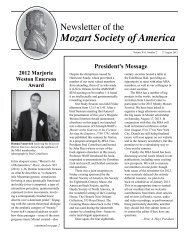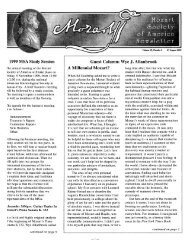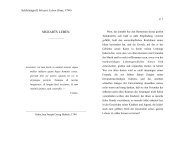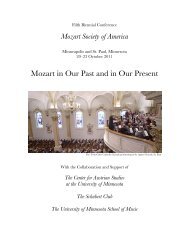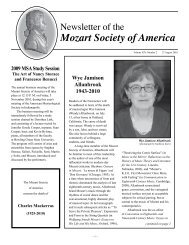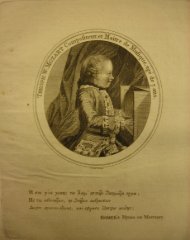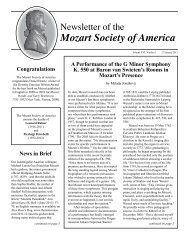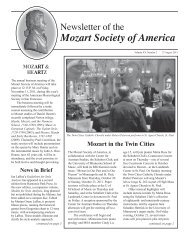January 2002 - Mozart Society of America
January 2002 - Mozart Society of America
January 2002 - Mozart Society of America
You also want an ePaper? Increase the reach of your titles
YUMPU automatically turns print PDFs into web optimized ePapers that Google loves.
Peter Gay. <strong>Mozart</strong>: A Penguin Life.<br />
New York: A Lipper/Viking Book,<br />
1999. 177 pp. $19.95.<br />
"The life <strong>of</strong> <strong>Mozart</strong> is the triumph <strong>of</strong><br />
genius over precociousness." With this<br />
succinct declaration <strong>of</strong> his central theme,<br />
Peter Gay launches the Penguin Lives<br />
<strong>Mozart</strong>. Penguin Lives, the publisher's<br />
website informs us, is "a series <strong>of</strong><br />
biographies about well-known historical<br />
and cultural figures written by some <strong>of</strong><br />
today's most respected authors." With<br />
Gay's engaging contribution, which<br />
clearly targets an inquisitive, nonspecialist<br />
readership, <strong>Mozart</strong> joins the<br />
Buddha, Joan <strong>of</strong> Arc, Charles Darwin,<br />
Crazy Horse, Mao Zedong, Elvis Presley,<br />
Martin Luther King, Jr., and others too<br />
numerous to list. Further, in calling Gay's<br />
work "a masterly example <strong>of</strong> biography in<br />
the short form," the anonymous annotator<br />
<strong>of</strong> the book's dust jacket signals that, in<br />
its emphasis on character and in its<br />
substantial development within a structure<br />
<strong>of</strong> modest proportions, <strong>Mozart</strong> is the<br />
biographical equivalent <strong>of</strong> the "short<br />
novel."<br />
Peter Gay brings impressive credentials<br />
to his task. Sterling Pr<strong>of</strong>essor<br />
Emeritus <strong>of</strong> History at Yale University<br />
and Director <strong>of</strong> the Center for Scholars<br />
and Writers at the New York Public<br />
Library, the distinguished cultural<br />
historian has received accolades for his<br />
penetrating studies <strong>of</strong> the Enlightenment<br />
(for example, The Enlightenment: An<br />
Interpretation, 2 vols., 1966-69). He is<br />
ideally equipped, therefore, to transmit<br />
abundant background information<br />
concerning the history, politics, religion,<br />
and intellectual currents <strong>of</strong> <strong>Mozart</strong>'s time.<br />
In addition, with today's scholars probing<br />
their subjects ever more psychoanalytically,<br />
Gay's formidable grasp <strong>of</strong><br />
that field (as demonstrated in Freud: A<br />
Life for our Time, 1988) yields rich<br />
dividends in the coverage <strong>of</strong> his<br />
foreground figure.<br />
Dedicated "in friendship and<br />
gratitude" to the musicologist Leon<br />
Plantinga, a Yale University colleague,<br />
<strong>Mozart</strong> consists <strong>of</strong> eight chapters,<br />
supporting end notes, and a concluding<br />
"Bibliographical Note." Single nouns<br />
suffice to indicate the thrust <strong>of</strong> each<br />
chapter. Developed immediately in<br />
Book Review<br />
Chapter One ("The Prodigy") is the<br />
proposition that <strong>Mozart</strong> was a genius. In a<br />
series <strong>of</strong> compact, richly textured<br />
paragraphs. Gay then introduces key<br />
persons and places, addresses <strong>Mozart</strong>'s<br />
early music education, first excursions,<br />
and the grand tour, and, by highlighting<br />
specific compositions, imparts a sense <strong>of</strong><br />
<strong>Mozart</strong>'s rapid musical development, to<br />
circa 1773. Early in Chapter Two ("The<br />
Son"), Gay writes, "Wolfgang <strong>Mozart</strong> was<br />
a good son, but was Leopold <strong>Mozart</strong> a<br />
good father?" (p. 27). The ensuing<br />
assessment owes much to Maynard<br />
Solomon's pioneering work, an<br />
achievement gratefully acknowledged by<br />
Gay. The Basle episode, <strong>Mozart</strong>'s<br />
preoccupation with anality, his encounter<br />
with the Weber family, and the Paris<br />
nightmare (to include <strong>Mozart</strong>'s "curious<br />
game <strong>of</strong> denial") are handled with clarity<br />
and candor.<br />
Set against an insightful examination<br />
<strong>of</strong> patronage, the growing tension<br />
between Archbishop Hieronymus and the<br />
<strong>Mozart</strong>s is the subject <strong>of</strong> Chapter Three<br />
("The Servant"). Two issues doomed the<br />
relationship, Gay believes: "the <strong>Mozart</strong>s'<br />
increasingly urgent pleas for extended<br />
time away from Salzburg and their all too<br />
transparent efforts to find for <strong>Mozart</strong><br />
what he could not hope to obtain at<br />
home-steady, well-paid, agreeable<br />
employment" (p. 51). Accounts <strong>of</strong> the<br />
Idomeneo project and <strong>Mozart</strong>'s dismissal<br />
from the archbishop' s service conclude<br />
the chapter. Chapter Four ("The<br />
Freelance") furnishes a lively report <strong>of</strong><br />
<strong>Mozart</strong>'s exhilarating first years in<br />
Vienna, to 1785. A host <strong>of</strong> personalitiesamong<br />
them Haydn, Baron Gottfried van<br />
Swieten, Constanze, and Emperor Joseph<br />
II-interacts with the enterprising young<br />
artist, whose piano concertos, string<br />
quartets, and Die Entfuhrung aus dem<br />
Serail receive particular attention.<br />
Rounding <strong>of</strong>f the chapter is a model<br />
discussion <strong>of</strong> <strong>Mozart</strong> and the masonic<br />
movement that affected him so<br />
pr<strong>of</strong>oundly.<br />
Functioning as a cluster, the next three<br />
chapters <strong>of</strong>fer three different perspectives<br />
<strong>of</strong> the period 1785 to 1791. In Chapter<br />
Five ("The Beggar"), Gay concentrates on<br />
financial concerns and <strong>Mozart</strong>'s<br />
apparently depressed state <strong>of</strong> mind<br />
(among the causes, the ongoing contest<br />
-8-<br />
with his father, the rift with his sister, and<br />
the trauma <strong>of</strong> Leopold's death in 1787).<br />
Instrumental music dominates Chapter<br />
Six ("The Master"), with the final piano<br />
concertos, the string quintets, and the late<br />
symphonies at the forefront. With Chapter<br />
Seven ("The Dramatist"), opera occupies<br />
center stage. A delightful character sketch<br />
<strong>of</strong> Lorenzo da Ponte precedes a fruitful<br />
discussion <strong>of</strong> the <strong>Mozart</strong>/Da Ponte<br />
collaborations. The final masterpieces,<br />
Die ZauberJlOte and La clemenza di Tito,<br />
receive less space and less nuanced<br />
treatment than earlier operas. <strong>Mozart</strong>'s<br />
operas bear a marked family resemblance,<br />
Gay concludes, their three shared<br />
qualities being the splendor <strong>of</strong> the music,<br />
the individuality and strength <strong>of</strong> his<br />
female characters, and a deeper obsession<br />
that seems to drive <strong>Mozart</strong>'s creative<br />
powers: the father-son conflict.<br />
In Chapter Eight ("The Classic"), Gay<br />
strives mightily to separate fact from<br />
the"hardy legends" -those surrounding<br />
the Requiem, the final illness, and his<br />
death-spawned by the last months <strong>of</strong><br />
<strong>Mozart</strong>'s life. <strong>Mozart</strong> closes with a<br />
balanced overview <strong>of</strong> nineteenth- and<br />
twentieth-century reception history.<br />
Certain regrettable aspects <strong>of</strong> over<br />
commercialization notwithstanding, Gay<br />
argues that the comprehensive exposure<br />
<strong>of</strong> <strong>Mozart</strong>, "remains one <strong>of</strong> the<br />
achievements <strong>of</strong> which the dismal<br />
twentieth century can rightfully boast: it<br />
has raised <strong>Mozart</strong>'s music-all <strong>of</strong> it-to<br />
the eminence it deserves" (p. 163).<br />
As a prelude to some considerations <strong>of</strong><br />
style, content, and interpretation, three<br />
decisions (whether editorial or authorial,<br />
I do not know) invite comment. First, the<br />
attractively produced volume lacks an<br />
index-useful, I believe, even in<br />
biographies in the "short form."<br />
Although a bibliography per se is also<br />
lacking, copious citations in the end notes<br />
and in the "Bibliographical Note" yield a<br />
plentiful harvest <strong>of</strong> sources, primary and<br />
secondary. Second, to designate<br />
individual compositions, Gay employs the<br />
original Kochel numbers (1862), together<br />
with periodic invocation <strong>of</strong> the<br />
nineteenth-century <strong>Mozart</strong>'s Werke<br />
numbers within work types, such as,<br />
"Piano Concerto No. 20" (that is, the<br />
Piano Concerto in D minor, K. 466).<br />
Properly explained, a K.lK.6 system



